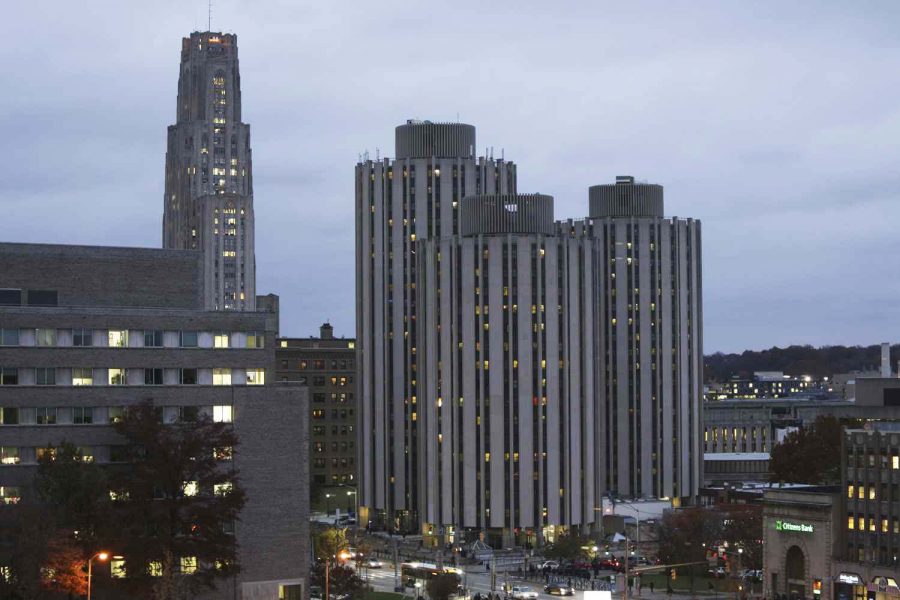What you need to know about monkeypox at Pitt
The Cathedral of Learning and Litchfield Towers.
August 30, 2022
Even though there have been no confirmed student cases of monkeypox at Pitt as of Aug. 24, according to Pitt spokesperson Janine Fisher, some students fear that the University might return to the days of isolation and virtual learning that they experienced during the COVID-19 pandemic.
Emma Garris, a senior neuroscience and psychology major, said she first heard about monkeypox over the summer on social media. She planned a trip to New York City and decided to start monitoring cases in that region. Garris quickly grew fearful of how rapidly the virus was spreading.
“It’s giving me flashbacks to 2020 before we got sent home from campus because we all thought it wasn’t going to be a huge deal then, and now look what COVID has turned into,” Garris said.
Allegheny County reported its first case of monkeypox on June 30 and has since reported 55 confirmed cases. A student at Penn State also tested positive for monkeypox. At the national level, monkeypox has been declared a national health emergency, which contributed to concerns expressed by members of the Pitt community.
However, Seema Lakdawala, an associate professor in the department of microbiology and immunology at Emory University and an adjunct professor in the department of microbiology and molecular genetics at Pitt’s school of medicine, said given the way monkeypox spreads, she doesn’t think it will warrant mandatory masking or university closures.
She added that masks aren’t effective against monkeypox because the virus can’t be inhaled.
“With coronaviruses, people who were presymptomatic were transmissible, which meant that before you had any symptoms or felt sick at all, you were spreading the virus,” Lakdawala said. “It’s unclear whether that’s happening right now with monkeypox, but the data seems to suggest that it’s not.”
Jay Darr, the associate dean of students for wellness, recommended in an Aug. 19 email that students avoid contact with people who may be infected, along with contaminated bedding and other materials. He also suggested avoiding skin-to-skin contact with anyone who has a rash, using personal protective equipment when caring for someone who is infected and washing hands with soap and water, as well as practicing safe sex.
While Darr said Student Health Services isn’t giving out monkeypox vaccines directly, he said if someone has a confirmed exposure to monkeypox, SHS will refer them to the Allegheny County Health Department Immunization clinic. Staff at the clinic, which is located Downtown, will determine if someone is eligible to receive a vaccine on a “case-by-case basis” through Health Department case investigators.
Darr added that people can avoid contracting monkeypox if they get a vaccine within four days of exposure to the virus.
People in Allegheny County prioritized to receive a monkeypox vaccine, based on Pennsylvania Department of Health guidelines, include individuals who had direct physical contact with someone diagnosed with the virus, individuals who had a sex partner within the last two weeks that is experiencing symptoms of the virus, inviduals who participated in an activity where multiple cases of monkeypox occurred and individuals who “exchange sex for money or goods.”
Other prioritized groups, according to the county’s website, include men who have sex with other men and gay, bisexual, transgender, gender non-conforming or gender non-binary individuals who had anonymous sex partners in the past two weeks that reported the following:
- Met their partner through an app or social venue
- Were recently diagnosed with a sexually transmitted illness or think they may have been recently exposed to one
- Take HIV pre-exposure prophylaxis (PrEP)
- Have an illness that weakens their immune system
- Have eczema
The county also said on its website that it hopes to expand eligibility as vaccines become more widely available.
Monkeypox’s primary mode of transmission is through skin-to-skin contact, according to Lakdawala. She said monkeypox does not transmit through the air like COVID-19 does, and physical contact poses the biggest threat for possible infection.
“When we talk about the spread of viruses, what we really need to think about is, where does that virus have to land on us in order to initiate an infection,” Lakdawala said. “This is a sort of skin pathogen, and you become infected by having prolonged contact with somebody who is shedding monkeypox as a positive rash.”
She said the best preventative measure any university, such as Pitt, could take is to educate members of its community on how monkeypox spreads from person to person.
“I think it’s important for us to educate vulnerable populations on how this spreads,” Lakdawala said. “We’re talking about prolonged skin-to-skin contact, so if there is somebody who has a rash or a fever, really be cognizant of covering up that area.”








